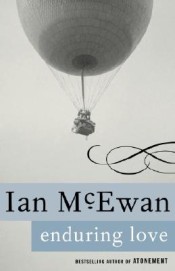 Ian McEwan
Ian McEwan
Anchor ($15.95)
by Andrea C. Holland
Love is eulogized in most blues and popular songs, and the more tenacious and binding the love the better: "The only kind of love is stone blind love," Tom Waits sings; "Love is blindness," croon U2; and we hum along. We do so because this obsessive, blinding, binding love is familiar in our culture; we idealize it, we may even secretly long for it, and for the intoxicating effects it has on our physical, emotional, even spiritual parts. It's in our stories as well: Romeo and Juliet, Jason and Medea, Tristan and Iseult, Ted (Hughes) and Sylvia (Plath). Obsessive ardor also features in Ian McEwan's new novel, Enduring Love—but as a sharp antidote to the illusory longing in popular stories and songs.
Brought together by a ballooning accident, two men exchange words briefly, but fatefully: this moment is the catalyst for an obsession by the younger man, Jed Parry, for the protagonist of the story, Joe Rose. Rose's wife, Clarissa Mellon, witnesses the accident but she, like Joe, misses the moment that generates the obsession which rips their lives apart.
Joe Rose is a science journalist, and McEwan uses his rationalism repeatedly as a foil to Parry's irrational fixation. This contrast creates a layer of tension to the story, which is then heightened by the juxtaposition of suspense and the discussion that surrounds suspense. McEwan lingers on the details—a wine bottle being opened, the label on the bottle, a red shoe lace—holding the suspense until the moment of revelation. And there is more than one revelation in this book. Early McEwan stories built suspense similarly, but only for so long. In this, McEwan's fifth novel, it escalates: "before I let [the gust of wind] reach us let me freeze the frame—there's a security in stillness—to describe our circle."
This may be McEwan's finest novel to date, for several reasons; first the opening, which immediately draws you in—"we were running towards a catastrophe"—but which we are not yet allowed to see. Such is McEwan's craft: he deliberately parallels this initial blindness (on the reader's part) with his characters' initially blinkered view of the situation. Another good thing: the characters are complex, interesting people with believable lives in a bizarre situation. We quickly come to care what happens to them. Then there are lovely resonances about memory and love, from whence
the title comes. Take this early line: "Lately I'd had the idea that Clarissa's interest in these hypothetical letters [of Keats] had something to do with our own situation, and with her conviction that love that did not find its expression in a letter was not perfect." This is a gorgeous moment because every word of it becomes true in this story—but not in a way we could possibly imagine. "Our love was just the kind to endure" says Joe of Clarissa. "Our love was the kind meant to go on" writes Clarissa to Joe. Such tenderness at the broken, finished (their word) moments later in the novel is bittersweet—and ironic, when neither one loves with "enduring love" like Jed Parry.
Added to all this Platonic speculation is another layer: Love does not necessarily equal security. Even in our strong houses, our 4 x 4s and our stable marriages, we are not safe; McEwan knows this, and exploits it well in the novel. Rose is vulnerable, as any of us are, to passing fate and bad luck, and its frightening to see how scant is our protection. It leads Joe to a lonely, dangerous place with everyone doubting him—including, eventually, us readers.
There's an unusual and very welcome ending to the story, though not quite a resolution; the scientific and epistolary genres tend to leave things unsettled, with neither a happy nor sad conclusion. But the novel wraps up neatly, deftly, and it left me pondering on a train hurtling through the British countryside: who was Joe, who Clarissa, and who the lonely obsessive Jed Parry of all this varied, shabby, fine humanity in the train car, sitting beside me, inside me.
Click here to purchase this book at your local independent bookstore

Rain Taxi Print Edition, Vol.3 No. 1, Spring (#9) | © Rain Taxi, Inc. 1998
